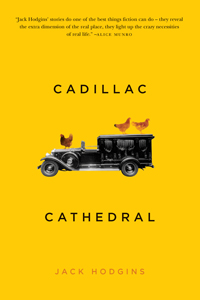Reviews
Fiction Review by Holley Rubinsky
Jack Hodgins, Cadillac Cathedral (Vancouver: Ronsdale, 2014). Paperbound, 216 pp., $18.95.
Jack Hodgins had the good fortune to be born on Vancouver Island, a part of the  country where he would stay, an area he would continue to mine and write about, a very particular, insular place in its own right. This territory and the fiction he sets there has brought him renown and endeared him to many, many readers. Hodgins displays a fondness for the charm of the mundane, where big things do happen every day to rural people. He gives plain-spoken and reassuring advice to the reader: “But you had to try…You have to try if you want the right to complain after you’ve been ignored.”
country where he would stay, an area he would continue to mine and write about, a very particular, insular place in its own right. This territory and the fiction he sets there has brought him renown and endeared him to many, many readers. Hodgins displays a fondness for the charm of the mundane, where big things do happen every day to rural people. He gives plain-spoken and reassuring advice to the reader: “But you had to try…You have to try if you want the right to complain after you’ve been ignored.”
Cadillac Cathedral , Hodgins’ fifteenth book, started as a project with Vancouver’s Chor Leoni Men’s Choir. As Hodgins is quoted as saying on the Chor blog dated January 20, 2014, “The adventures of three aged friends using a beautiful resurrected 1930s hearse to collect an old friend who has died in hospital (and incidentally to look up an old flame) seemed irresistible to me and appealed to Chor Leoni. The ‘idea’ became a script, which then accumulated songs and a date on stage. Meanwhile, the characters continued to nag at me until they became a full-length (though short) novel.”
The shortness of the novel may have nagged at the author, as well, which is why the reader really knows, from about page 56 to the novel’s end, that Arvo Saarikoski really, really figures he may be on a “fool’s mission” in going back fifty years in time to search out Myrtle Birdsong. At one point the hearse is in danger of being stolen by a realtor who covets it. On page 157, we read: “This close to looking up Myrtle Birdsong, this close to taking Martin home, he could not afford to take the chance of losing the Cadillac Cathedral now—even if it meant staying awake all night. And yet—though he hated to admit this—if he did fall asleep there would be some relief in waking up to find this whole business had been taken out of his hands…” But Arvo rallies, as the reader expects from this refreshing main character, a bachelor in his mid-seventies. “He wasn’t eighteen any more. He was a man with most of his life behind him. How many chances could a man afford to ignore?” The elderly bachelor as hero is familiar territory for Hodgins; another seventies-something man stars in The Master of Happy Endings (2010), a novel Alice Munro praised in part due to the “marvel of keeping going,” a sentiment many of us fully appreciate and one that Arvo, quietly pursued by the sympathetic Cynthia, doesn’t question.
The reader is deftly led through Arvo’s misadventures with the woman from Thunder Bay, his love of fixing up old vehicles, his garage as community hub for folks who are funny, ornery, and sometimes almost too quirky. And when the show hits the road, Hodgins excels in describing characters discovered in detours, as here: “Great-great-grandpa Enright had been wrapped in heavy Hudson's Bay blankets and propped in a green plastic lounge chair beside his coffin. A knitted wool hat had been pulled down far enough to cover his ears. Only the bare necessities of eyes and nose and mouth were visible in a face so wrinkled it might have been removed and wrung out like a wet rag and only half-heartedly reattached. Arvo looked with some confusion into this face until he saw that two milky eyes seemed to register his presence.”
This slightly impatient reader could have happily done without some of the longer accounts and repeated explanations that do, indeed, ensure that the motivation of everyone in the story is perfectly clear. In this steady-as-she-goes tale, “knowing the story” won’t spoil it for those who take pleasure in following the ins-and-outs. Hodgins’ generous, easygoing narrative is as lanky and loose-limbed as Arvo himself, a style satisfying for a reader who enjoys the nostalgic idea that people actually have the time to follow a slow-moving, resurrected hearse along the coast road to the (unnamed) city. The days when neighbours were neighbours, and people were genuinely inquisitive about each other’s activities, as they are in Cadillac Cathedral, are a sweet reminder of a different era. Fans of Hodgins’ Portuguese Creek novels—Broken Ground (1998); The Macken Charm (1995), and Distance (2003)—will find the conceit appealing.
—Holley Rubinsky









